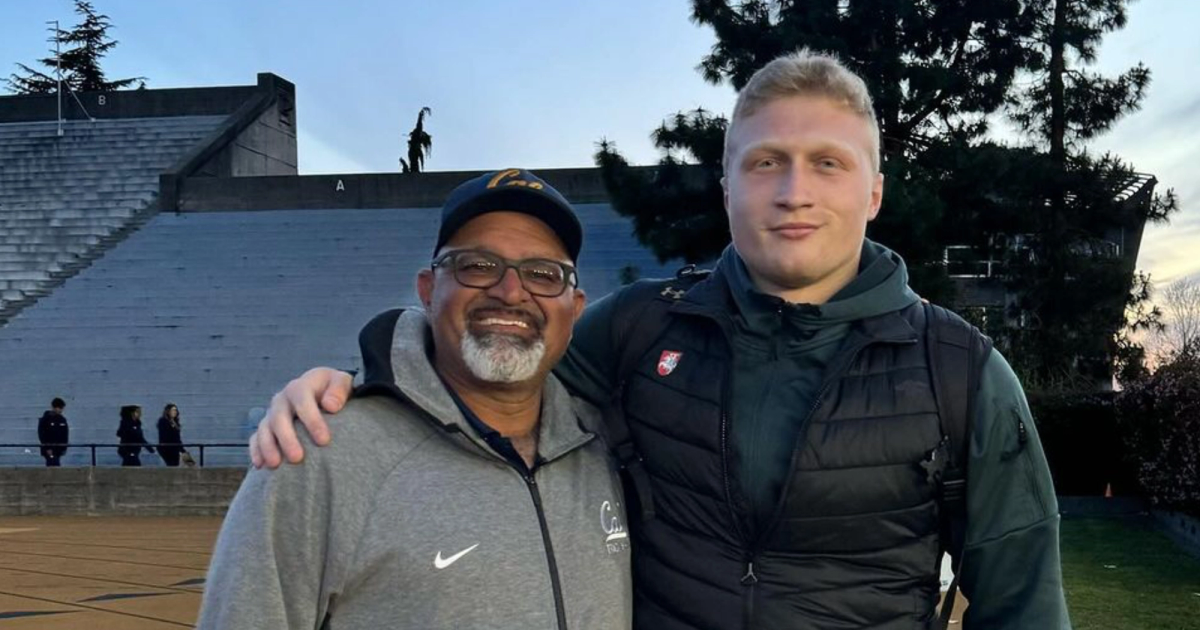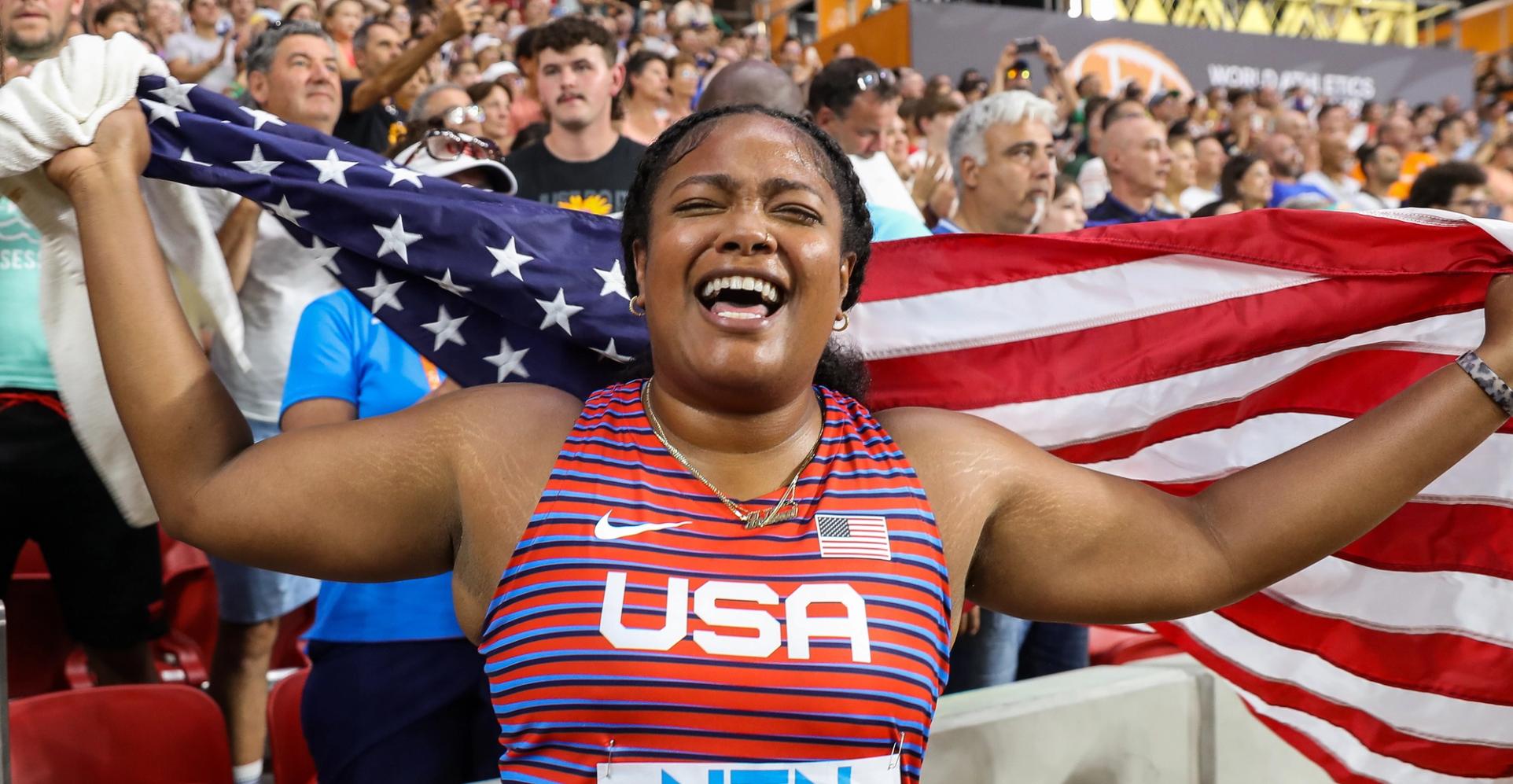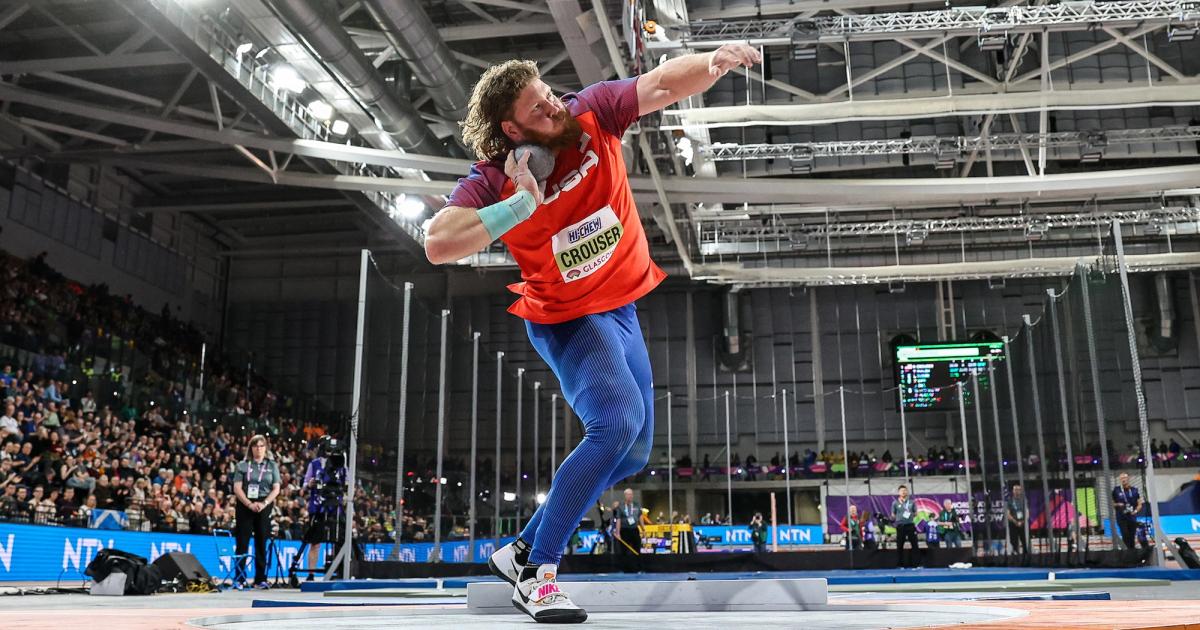By Paul Hof-Mahoney
May 6, 2024
With the 2024 Diamond League circuit getting underway in the last couple weeks, one of the most anticipated athletes to get back into international competition is 21-year-old Lithuanian discus thrower Mykolas Alekna. The two-time World Championship medallist’s season is off to a blazing start, breaking Jürgen Schult’s 37-year-old world record last month with a mark of 74.35m.
We caught up with Alekna before he leaves his collegiate team in California to head back to Europe for a busy summer. Alekna broke down his historic day in Oklahoma, talked about growing up as the son of one of the greatest throwers in history, and revealed that “pressure” simply isn’t a word in his vocabulary.
CITIUS MAG: You are 21 years old, and you just broke the oldest world record in men’s track and field. How does that feel?
Mykolas Alekna: I mean, that feels amazing. If someone had told me five or six years ago that I would break the world record I wouldn’t believe them, but yeah it just feels amazing. My consistent work and, you know, disciplined work and working with a good team and with good coaches, it paid off. I’m really happy that I can call myself a world record holder.
You broke the world record in Ramona, Oklahoma, which has gained a reputation over the last year or two for producing some really big throws. What went into the decision between you and your coaches to go out to Ramona to compete in that meet?
Before the season I wasn’t planning to go to Ramona, but my training was going pretty well and in practice I was throwing far. I was like “maybe I should go there and try my luck,” so me and my coach just decided to go there and have fun and compete and maybe get one big throw. That’s what happened and I’m really happy with it.
The week before, you had thrown 71.39m in Berkeley. After that, coming into Ramona, was the world record something you had set in your mind, or were you just going to try to go out there, no expectations, and try to go as big as you could?
I knew that with good conditions I could throw the world record, but that was never my goal. I didn’t feel any pressure honestly, I was just trying to enjoy the competition. From the past I’ve learned that if you try to force something, it’s not good. When there’s more pressure, you usually don’t perform as good as you want to. So I never tried to set a world record, but I knew that I could do it.
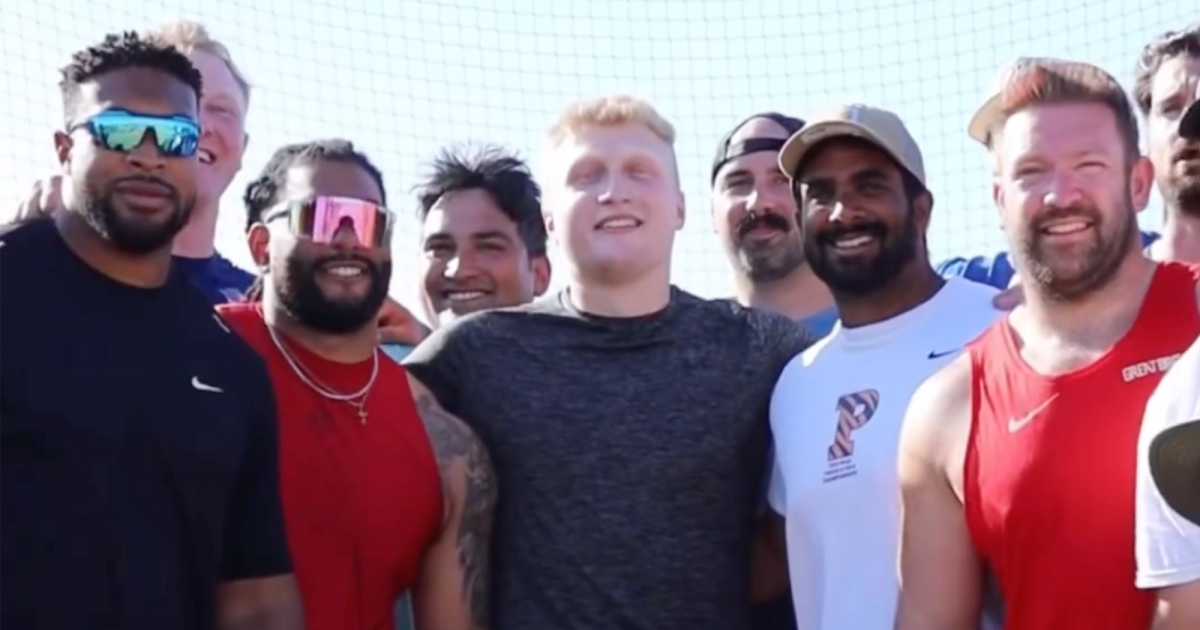
Throwing in that wind can be a benefit, but it can also be something that can be difficult to manage. Were you able to get a little shakeout session in beforehand or how did you deal with those conditions on that day?
I just arrived the night before the meet, so I had never seen the ring before. But I talked to some people that told me it’s a good place to throw. The conditions are really good, the sectors and the circles are really nice. So during the meet, that was my first time there and everything was really good.
Your first throw of the competition, you kind of walked out of the back of the circle shaking your head. It still ended up being 72.21m. With that throw, where you didn’t necessarily feel great about it but it was still that far, did it then really click in your head that 74m and above could be a possibility?
Oh yeah, for sure. My first throw, I didn’t think it was gonna go that far and it wasn’t my best throw. I was a little bit disappointed, but then I realized “today I can throw really, really big and it’s just a matter of time.”
Now, that fifth round throw where you actually did break the world record, did you know as soon as that one came out of your hand that it was the big one?
Yeah, I think if there was no wind, in a stadium, it felt like a 71m throw. I throw over 70m in practice and I know how it feels. If there was no wind it would be around 71m but the wind was great, so in my mind I knew it was probably further than 74m. It felt like a really nice throw, smooth, light and long, so I knew it was gonna be good.
At the meet, Ryan Crouser was also there because he was with Rojé Stona. It was really cool that the shot put world record holder was there to watch the discus world record get broken. What was it like being able to do that in front of someone who has done before what you did on that day?
It was great, I didn’t expect Ryan to come to this meet but I was really excited. I saw him when I was throwing, and he was recording my throws behind the circle, and I saw him every time. It was really fun, and I’m glad he was able to come to the meet and watch and support all the throwers.
You got the world record, but you also got the family record, taking that from your dad, Virgilijus. What was his reaction from you breaking his family record? Was there any playful ribbing with you or just support?
It was late at night when I broke the record, I think he saw the result but he was still in bed so I didn’t call him back home. I called him the next morning, him and my mom, and they were really, really excited. My dad, obviously he said congratulations and he’s really proud of me. They’ve always supported me since day one and I’m really happy to have parents like that.
For my money, your dad is the greatest discus thrower in history, so did you ever feel any pressure growing up with “Alekna” as your last name going into any competitions?
No, honestly I’ve never thought about that. I throw discus because I like it, not because my dad wants me to throw or because other people want me to throw. That’s my choice and I decided to do it. I’ve heard people say “oh, your dad is a great discus thrower” and try to put pressure on me, but that never gets to my mind. I just try to enjoy when I throw because that’s what I love to do. I don’t really care how I do as long as I like it and am enjoying the process.
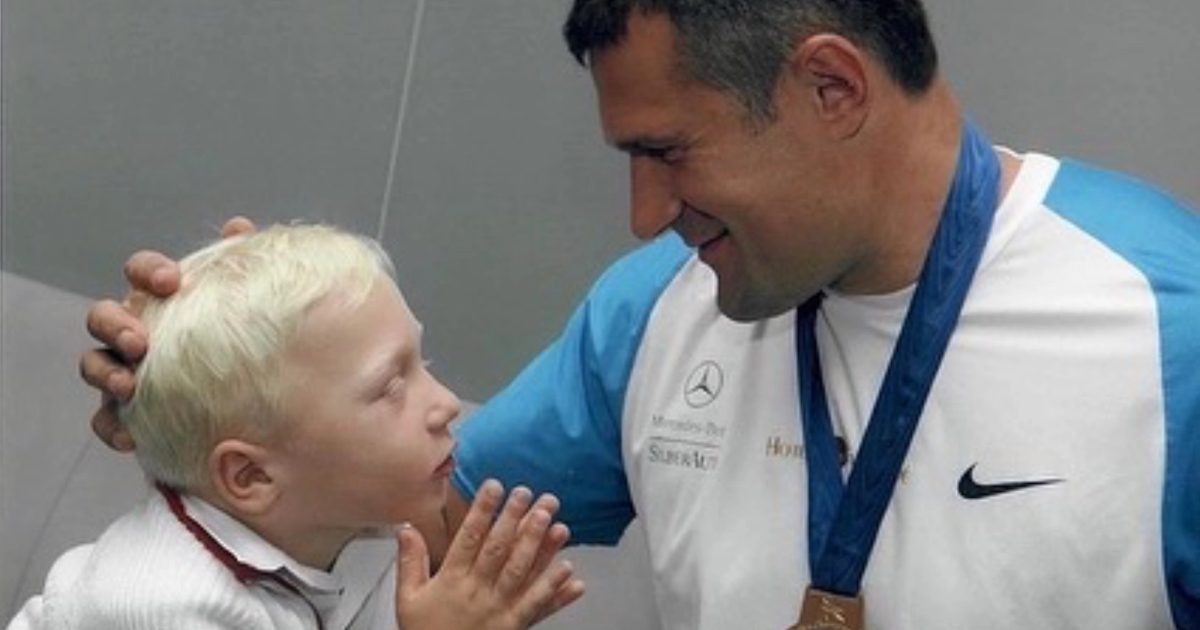
Instagram/@alekna.m
Do you have a favorite memory from growing up and going to your dad’s big competitions, like World Championships and Olympics? Any big moment that sticks out to you from standing in the crowd watching your dad compete?
To be honest, I’ve never been to a big meet with my dad, I would always stay at home. My dad would like to go to the meets alone and focus without the family, so I’d always watch the meets on the television. But I remember watching the London Olympics in 2012, I was 10 years old so I remember that really well. He was fourth, and then I was really disappointed, but now I realize he was already 40 years old. He’s one of the greatest of all-time, and fourth place at 40 years old throwing 67m – that’s really, really good. I hope I can throw over 67m at that age as well.
It’s not just your dad, though. Your brother, Martynas, had a really strong year last year, throwing over 67m. He’s only a couple years older than you, so was there any kind of friendly sibling rivalry between you guys growing up, just going back and forth in the ring?
Yeah, I mean, there was rivalry but we get along really well. When I get back home, we always train together. My brother started throwing discus two years before me and I joined him two years later. Since then, we would always train together everyday. We get along really well. Of course there’s some competition to try and beat each other, but I think it’s really good. It helps both of us to do better and progress. It’s really helpful and I’m really happy I have my brother with me and we both throw discus and can support each other in the meets. We both were at the World Championships last year and it was a great experience, both of us in the same meet. It was just amazing and I’m really glad I can do that with my brother.
You had a really good junior career, where you were the U20 World champion in 2021 and sat second on the all-time U20 list when your junior career was over. What went into the decision, after such a great junior career, to move to the NCAA and come to America to compete collegiately?
I had decided I wanted to come to the U.S. before I threw 69m and before I became the European and World U20 Champion. I didn’t think I was gonna do that great, but I progressed really fast. Even after winning the World championship, I still wanted to come to the U.S., still wanted to experience how life was in the United States. I wanted to go to college, get a degree. My parents really supported my decision to come here because education is really important for my family.
When you were making that decision, what made Cal really stand out to you?
I knew that Coach Mohamad Saatara is a really good coach, he was already coaching Camryn Rogers [2023 World champion in the women’s hammer throw], and he had a few good discus throwers before. Berkeley’s a really good school, one of the best schools in the world, and I couldn’t just say no to the offer. Coach Mo wanted me to come to Berkeley, and I think that’s the best decision I’ve made and I’m really happy to be here.
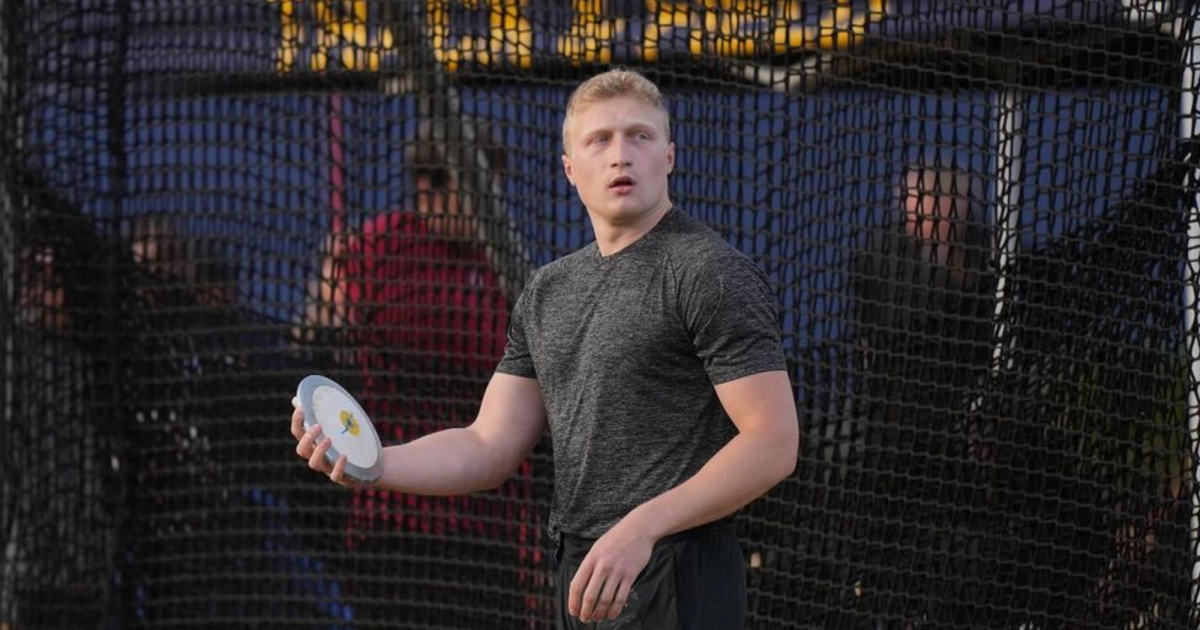
Courtesy of Cal Berkeley Athletics
You brought up Coach Mo, you’re in kind of an interesting situation because you also work with Coach Mantas Jusis back in Lithuania. What does that dynamic look like when you’re in the U.S. training in California? Does Coach Jusis have any influence on your training, or does he just handle when you’re back in Europe over the summer?
When I’m in Berkeley, I send Mantas some videos of me lifting and throwing. We talk about throwing a lot too, I call him every week. Mo communicates with Mantas, they’re always in touch and discuss what’s best for me. They work together as a team and get along really well. I’m really happy because both of them have the same goal. They want to help me out and they want me to do my best and we work towards that goal. We’re a really, really good team together.
Many of CITIUS MAG’s readers are more tuned into the running events, so could you really quickly just walk us through what a typical week of training looks like for one of the absolute best throwers in the world?
Yeah, so I train on Mondays, Tuesdays, Thursdays and Fridays. Four days a week I throw discus and also do some technical training. So I train eight times a week and four days a week.
You and your coaches have an interesting philosophy in the weight room, kind of opposed to what you see from some of the other guys over in Europe like Daniel Ståhl and Kristjan Čeh. They seem to lift really heavy a lot, but I know that you and your coaches aren’t necessarily focused as much on putting up those really big numbers in the weight room. When did that training philosophy really start and what’s the reasoning behind it?
I think that everything depends on the thrower and your body because we’re all different. Some people like to lift heavy, but since I’ve gotten into the sport I never tried to lift heavy. I would just focus on speed more, and Mantas noticed that. When he writes up my training, he makes sure that all my lifts are really explosive and fast, and Mo Saatara has the same philosophy and training. I just think it depends on the thrower. For me it works. For other throwers, they like to lift heavy and that works for them. Everything depends on who you are and how your body has developed.
You’re red-shirting this year at Cal to compete collegiately again in 2025. What goes into that decision to stay in the NCAA as opposed to fully going pro when you’re already a two-time World Championship medallist, the world record holder, and potentially an Olympic medallist this summer?
Mainly, it’s not that I want to compete in the NCAA, but I want to get my diploma, I want to get my degree from Berkeley. If I compete in the NCAA, I get a scholarship so I don’t have to pay for my education. So I’ll take one more year, compete, and get my degree.
You’ve mentioned your degree a lot and that it’s very important to you, what are you studying?
Psychology.
Now that you are already the world record holder, what are some of the specific technical aspects of your throw that you’re still working on day-in and day-out to keep pushing farther and farther and compete better and better at global championships?
The things we’re working on in practice may seem really simple. I see some throwers saying “oh, your leg has to go to 40-degrees or 50-degrees,” we don’t go into detail like that. What we focus on is the feeling of the throw. I’m trying to stay long, trying to stay relaxed. Trying to stay on the ground and not jump during my throw and being more patient.
The past two years, when it comes to World Championships, you’ve kind of gone into them as the “young gun” without a ton of pressure on you. Now you’re going into the Olympics, which in and of itself brings more pressure than the World Championships, as the world record holder. What are you and your coaches going to do to try and handle that added pressure as the season moves along and we get closer and closer to Paris?
I don’t feel any pressure, honestly. If I don’t do that well, I still do what I love. I love the sport and I know that I have a lot of years ahead of me, I’m still really young. I don’t think we’re even gonna talk about the pressure with my coaches because I don’t think it’s a problem for me.
What would you say is your favorite competition you’ve ever been a part of?
Oh, that’s a good question. I would say the Stockholm Diamond League, it’s one of the greatest meets. I’ve been there twice and the atmosphere is amazing, the stadium is always full. I love the stadium, it’s a really old stadium and I just love competing there. In Sweden, they love discus throwing because of Daniel Ståhl and Simon Pettersson, two great throwers, and I’m always happy to go there and compete.
You’re going back to Stockholm this summer, right?
Yes.
Aside from Stockholm, what does the rest of your international schedule look like right now before Paris?
My next meet is in Morocco, it’ll be a Diamond League meet. After that I’ll go home to Lithuania and train for a few weeks. Then I go to the Oslo Diamond League, then Stockholm, and then in June I’ll be competing at European Championships. Then it’s national championships and then the Olympics.
Thank you so much for your time, Mykolas, and best of luck this summer!
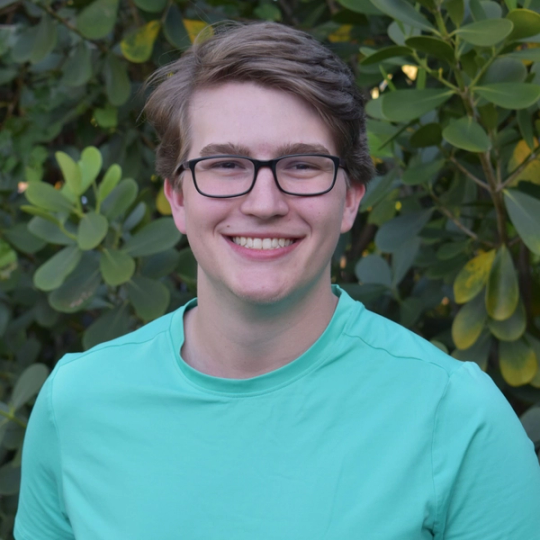
Paul Hof-Mahoney
Paul is currently a student at the University of Florida (Go Gators) and is incredibly excited to be making his way into the track and field scene. He loves getting the opportunity to showcase the fascinating storylines that build up year-over-year across all events (but especially the throws).
